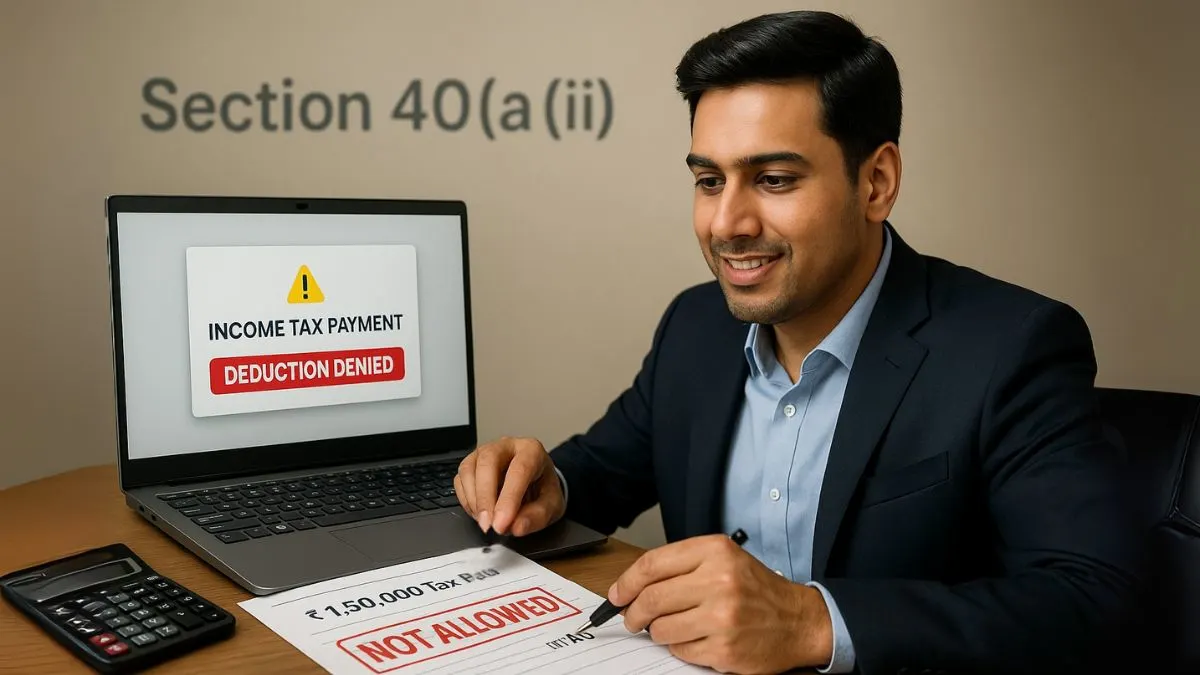
What Exactly Is Section 40(a)(ii) of the Income Tax Act?
Section 40(a)(ii) may look like a small clause in the Income Tax Act, but it has a huge impact on business taxation. Under this provision, any amount paid by way of income tax shall not be allowed as a deduction while calculating profits & gains of business or profession.
So, if your company pays income tax out of its profits, that amount cannot be claimed as a business expense, no matter how significant it might be.
Why Does This Matter to Businesses?
Businesses often make the mistake of assuming any payment related to the government is a legitimate expense. But that’s not the case with income tax.
Section 40(a)(ii) clearly states that income tax paid under the Income Tax Act cannot be deducted from business income, even if it’s reflected in the books & P&L statement.
This means you might be overstating your deductions & under-reporting your taxable income — leading to penalties, interest & even scrutiny from the tax department."
What About Surcharge & Cess?
This has been a point of debate for years. While the section talks about income tax, the big question is — can you claim cess or surcharge as a deduction?
Earlier, companies would deduct education cess or health & education cess as part of the business expenditure. However, recent judgments & clarifications suggest that even cess & surcharge are part of income tax, so they too may fall under disallowance.
In Budget 2022, the Finance Ministry made it crystal clear: Cess & surcharge related to income tax will also be disallowed retrospectively. That means even past claims could come under scrutiny.
Let’s Simplify This With an Example
Suppose your business made a profit of ₹50 lakhs. Out of that, you paid ₹10 lakhs as income tax, including cess & surcharge. If you show that ₹10 lakhs as an expense in your Profit & Loss account, the tax officer will add it back, disallowing it under Section 40(a)(ii).
You’ll now be taxed on ₹50 lakhs again — leading to double taxation & increased tax outgo.
What Expenses Are Allowed?
This doesn’t mean all government-related payments are disallowed. The section only applies to income tax under the Income Tax Act. Other levies such as:
- GST
- Customs duty
- Stamp duty
- State-level taxes or fees
…can still be claimed as a deduction if they’re genuinely incurred for the business.
But be cautious — if you try to disguise income tax payments under another head just to claim a deduction, it can backfire & attract penalties."
How Can You Stay Compliant?
✅ Don’t include income tax payments in your business expenditure calculations.
✅ Segregate taxes properly in accounting software or P&L statements.
✅ Stay updated with Finance Acts & CBDT clarifications to avoid retrospective impacts.
✅ Consult a CA regularly to ensure accurate treatment of taxes & expenses.
Section 40(a)(ii): Quick Points to Remember
- Income tax paid is not a business expense — it comes from profits, not for generating profits.
- Cess & surcharge are now explicitly disallowed from FY 2005-06 onwards.
- Wrong deduction may lead to additional tax demand, interest & even notices.
- This section doesn’t apply to indirect taxes or regulatory fees.
Common Mistake: Mixing Up Advance Tax & Regular Tax
Advance tax is also income tax, just paid in instalments. So it falls under the same disallowance rule. Many businesses wrongly show advance tax as an expense in the books, which gets flagged during assessment or audit.
Final Thoughts: Don't Let a Simple Section Derail Your Tax Planning
Section 40(a)(ii) may seem minor, but it’s one of those silent killers in your tax return. One wrong entry, one misunderstood line item, & you could be facing tax reassessments, loss of credibility & unnecessary cash outflows.
Your financial statements reflect the health of your business, & incorrect tax treatment can seriously distort that image.
💡 Need help in accurately structuring your books & taxes? Let our team at Callmyca.com handle it — so you never worry about missed deductions or surprise tax disallowances again.











